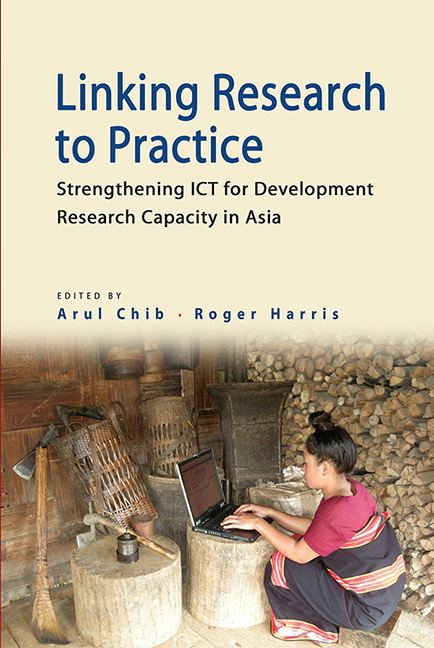Book contents
- Frontmatter
- Contents
- List of Tables
- List of Figures
- Foreword
- Preface
- Acknowledgement
- SECTION I MANAGEMENT PERSPECTIVES: INSIDERS' THOUGHTS ON THE PROGRAMME
- SECTION II RESEARCH PERSPECTIVES: THEORETICAL REFLECTIONS BY EXPERTS
- 5 ICTD Praxis: Bridging Theory and Practice
- 6 Messy Methods for ICT4D Research
- 7 Ethics and ICTD Research
- 8 ICTD Curriculum Development and Professional Training: Mainstreaming SIRCA Research Models
- 9 Multi-stakeholder Perspectives Influencing Policy-Research-Practice
- 10 From Production… To Dissemination… To Adoption
- SECTION III RESEARCH OUTPUTS
- SECTION IV SYNTHESIS AND CONCLUSION
- About the Contributors0
- Index
8 - ICTD Curriculum Development and Professional Training: Mainstreaming SIRCA Research Models
from SECTION II - RESEARCH PERSPECTIVES: THEORETICAL REFLECTIONS BY EXPERTS
Published online by Cambridge University Press: 21 October 2015
- Frontmatter
- Contents
- List of Tables
- List of Figures
- Foreword
- Preface
- Acknowledgement
- SECTION I MANAGEMENT PERSPECTIVES: INSIDERS' THOUGHTS ON THE PROGRAMME
- SECTION II RESEARCH PERSPECTIVES: THEORETICAL REFLECTIONS BY EXPERTS
- 5 ICTD Praxis: Bridging Theory and Practice
- 6 Messy Methods for ICT4D Research
- 7 Ethics and ICTD Research
- 8 ICTD Curriculum Development and Professional Training: Mainstreaming SIRCA Research Models
- 9 Multi-stakeholder Perspectives Influencing Policy-Research-Practice
- 10 From Production… To Dissemination… To Adoption
- SECTION III RESEARCH OUTPUTS
- SECTION IV SYNTHESIS AND CONCLUSION
- About the Contributors0
- Index
Summary
RA TIONALE Strengthening Asian ICTD research capacities goes beyond research and mentoring processes. In Asia as in the rest of the world, large and small scale ICTD undertakings at the regional, national and community levels are being planned, implemented and evaluated by international development assistance institutions, bilateral aid agencies, national and local governments, as well as the private sector. These programmes and projects have built-in research components that require adequately trained ICTD managers and staff.
The SIRCA programme can directly contribute to this need in two ways. Firstly, its research results should add to the content of ICTD instruction. Secondly, its research models should be incorporated into education and training. When linked to curricular content and professional training, the impact of SIRCA may assume a multiplier effect perhaps equal to if not more than the publication of its research findings because of its influence on development policy and practice.
OVERVIEW OF ICTD EDUCATION IN ASIA
The impetus for this chapter came from an observation of the lack of adequately trained ICTD manpower in Asia because of the dearth of quality formal and non-formal training programmes in this area. There may be a glut of information technology (IT) programmes, a respectable number of communication science programmes and quite a few development studies programmes in Asian educational and training institutions. However, programmes that combine IT, communication science and development studies that adequately capture the synergies inherent in their convergence are few and far between.
Information Technology Programmes. Asia's prominence in IT services outsourcing has spawned a wide array of programmes offered by both public and private institutions to supply industry manpower requirements. These programmes include baccalaureate and graduate offerings on information science, information technology, information systems, computer science, computer engineering and software engineering. They cover the entire spectrum of hardware, software, networking and systems management concerns of IT.
- Type
- Chapter
- Information
- Linking Research to PracticeStrengthening ICT for Development Research Capacity in Asia, pp. 82 - 94Publisher: ISEAS–Yusof Ishak InstitutePrint publication year: 2012

